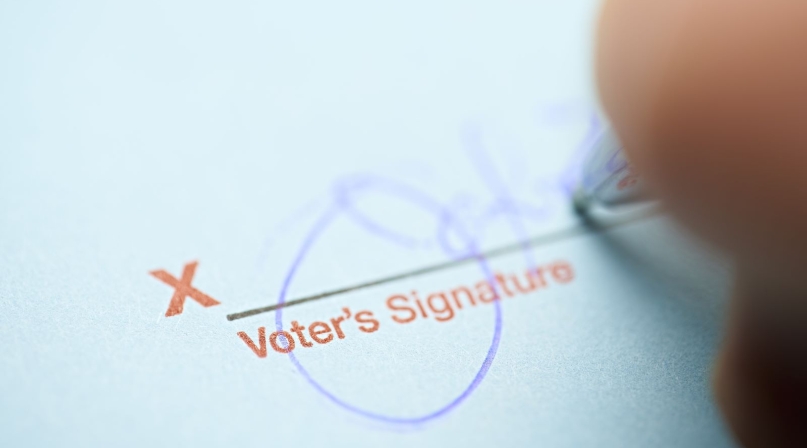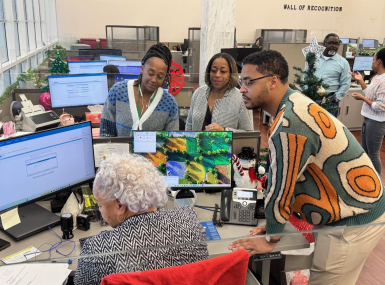Ten counties to test signature verification for vote-by-mail in North Carolina primary

Key Takeaways
Ten North Carolina counties are testing out signature verification for absentee ballots cast during the March primary that, if implemented statewide, would make North Carolina the strictest voting-by-mail process in the country.
The pilot program will not impact whether a vote is counted for the primary, as the signature verification process will begin after every vote is canvassed.
The pilot program was created through a state law enacted last year, which includes numerous changes for election management including shortening the mail-in ballot return window and banning private grants for election administration. Bertie, Cherokee, Durham, Halifax, Henderson, Jones, Montgomery, Pamlico, Rowan and Wilkes counties were chosen to participate in the signature verification pilot using a system of random selection that factored in rankings for population size, racial diversity and regional location.
Election workers in the participating counties will receive training on how to use the software and how to determine if a signature is valid following any flags from the software, according to Patrick Gannon, North Carolina State Board of Elections’ public information director. Some of the logistics of the pilot program, including selection of a signature verification vendor and the timeline of the training, are “still up in the air,” according to Karen Brinson Bell, executive director of the State Board of Elections.
“They handle the ballots during the election through the primary, but the actual ‘rubber meets the road’ is really going to be post-primary, so that gives us some time to work through that if necessary,” Brinson Bell said.
“This has been a short runway, when you consider that the budget and the authorization for all of this happened mid-October.”
According to the National Conference of State Legislatures, signature verification is the most common method states use to confirm that mail ballots come from the intended voter, however the pilot program has drawn some controversy as North Carolina already requires a copy of photo identification and two signatures of witnesses or a notary for mail-in-voting. During the 2020 primary election, 9.1% of absentee-by-mail ballots were rejected in North Carolina, while the rate lowered during the general election to at most 2.4%, according to State Board of Elections data.
The National Vote at Home Institute is a nonpartisan group that works to increase voter access to voting-by-mail. The nonprofit’s executive director, Barbara Smith Warner, said the addition of signature verification in North Carolina would be “a solution in search of a problem.”
“It crosses the line from voter security to voter suppression, I would argue,” Smith Warner said. “We are big believers in signature verification as an organization, but that’s not what this is. North Carolina, they already have multiple layers of security and the idea of this giving more security is pretty head-scratching.”
The National Vote at Home Institute suggests using a variety of signatures the state has access to from the voter over time, including potentially a driver’s license or marriage certificate, as a “best practice” for signature verification, according to Smith Warner. In North Carolina, Brinson Bell confirmed that the software will pull signatures from the state election management system to verify the signatures on mail-in ballots.
The North Carolina State Board of Elections must report its findings and recommendations from the pilot — including the estimated cost to implement signature verification across the state and feedback from the participating county boards of elections — to the General Assembly by May 1.
While the pilot program was funded by the legislature, Brinson Bell said it’s unclear if the cost of signature verification, would fall onto the counties if it were to be implemented statewide, because voting equipment is a county expense.
The funding devoted to the pilot program covers the necessary equipment and software for signature verification, but not personnel, according to Brinson Bell, which means more work for election workers.
“We’ll be looking to see how we can support them through it,” Brinson Bell said. “But in an ideal world, the software is going to do some of the sorting and some of the work so that it’s not a big lift for the staff in these county offices.”
While the software vendor hasn’t been finalized, Brinson Bell said that the State Board of Elections is looking at other states that use signature verification, specifically Utah and Oregon, to inform what would be the best fit for North Carolina.
According to the National Conference of State Legislatures, Utah poll workers compare the signature on mail ballots to the signature in the voter’s registration record and in Oregon, the county clerk compares the signature on the return identification envelope with the one on the elector’s registration record.
North Carolina sometimes has a “second primary,” which is essentially a run-off a candidate can request if no candidate reaches the necessary vote percentage in the primary to become the nominee; any “second primary” could potentially be “another stressor” in the process with the signature verification pilot for election workers, Brinson Bell said.
“We do have some very large candidate lists in even some statewide offices, so the potential is there,” Brinson Bell said.
“We just don’t know the results yet to know if that would happen. There are some challenges, but [election workers] are up to it, and luckily, we do have a strong participation with absentee by mail, but it’s not our most popular method of voting — that’s typically early voting — so I think it can be manageable.”
Jones County, the smallest county in the pilot, only has two full-time election workers, according to Jennifer King, the county’s election director.
“We’re always willing to step in and help out any way we can,” King said. “So, if us doing it can take that off some other county in the state, then I’m perfectly fine with that.
“But I feel like I need to start playing the lottery,” she joked. “Out of 100 people, 10 got chosen and we were one of them, maybe I need to start playing, that’s pretty good odds.”
King said she thinks it’s good that the pilot includes counties with a wide range in population, so that if signature verification becomes state-wide, there is a “better picture” of how it might impact a county based on the size of its operations. Jones County has a population of under 10,000, while the pilot’s largest county, Durham, has around 326,000 residents.
Racial diversity is another factor considered in the pilot.
Bertie County has the largest percentage of non-white voters out of the participating counties and 60% of its population is Black. LaToya Peele, the county’s election director, said it’s an “honor” for the county to be included in the pilot.
“It’ll just be something added that we have to do with our workloads,” Peele said.
“And of course, as directors of elections, it’s our duty to make sure our voters are fully prepared for everything that comes along. With us being a part of this pilot program, it will give Bertie County kind of a preview of what’s to come, with us in the testing stage of this process, so that will help us further educate the community if and when it becomes law.”
Related News

MEGA Act moves in House; NACo raises county concerns
On Feb. 10, the U.S. House Committee on Administration held a hearing to consider the Make Elections Great Again (MEGA) Act (H.R. 7300), which was introduced by Committee Chairman Rep. Bryan Steil (R-Wis).

House passes SAVE Act; Major impacts on county election administration
Next week, the U.S. House of Representatives is slated to vote on the Safeguarding American Voter Eligibility (SAVE) Act (H.R. 22), making it the chamber’s second vote on a version of the legislation in less than a year.

